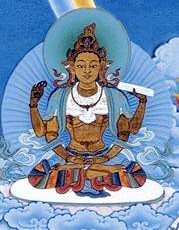Prajnaparamita: Difference between revisions
Jump to navigation
Jump to search
No edit summary |
|||
| Line 10: | Line 10: | ||
==Subdivisions== | ==Subdivisions== | ||
According to the teachings of the ''[[Abhisamayalankara]]'', there are four subdivisions: | According to the teachings of the ''[[Abhisamayalankara]]'', there are four subdivisions: | ||
#natural prajnaparamita<br> | #natural prajnaparamita<br> | ||
#scriptural prajnaparamita<br> | #scriptural prajnaparamita<br> | ||
| Line 17: | Line 16: | ||
==Literature== | ==Literature== | ||
All of the prajñaparamita [[sutra]]s can be classified in the | |||
*[[six mother scriptures]] and | |||
*[[ | *[[eleven son scriptures]]. | ||
*[[ | |||
==Notes== | ==Notes== | ||
| Line 33: | Line 29: | ||
[[Category:Key Terms]] | [[Category:Key Terms]] | ||
[[Category:Prajnaparamita]] | |||
[[Category:Mahayana]] | |||
[[Category:Paramitas]] | [[Category:Paramitas]] | ||
[[Category:Buddhas and Deities]] | [[Category:Buddhas and Deities]] | ||
[[Category:84000 Translations]] | [[Category:84000 Translations]] | ||
Revision as of 20:50, 11 November 2020

Prajñaparamita (Skt. prajñāpāramitā; Tib. ཤེར་ཕྱིན་, ཤེས་རབ་ཀྱི་ཕ་རོལ་ཏུ་ཕྱིན་པ་, sherchin; Wyl. sher phyin, shes rab kyi pha rol tu phyin pa) means 'Perfection of Wisdom', or more literally, ‘transcendent wisdom’. It refers to:
- the sixth of the paramitas: perfect non-conceptual wisdom.
- the class of Buddhist literature that was mainly discovered by Nagarjuna in the second century. Its central topic is emptiness.
- the female deity who is the embodiment of transcendent wisdom.
Definition
"Prajnaparamita is the wisdom of directly realizing the non-conceptual simplicity of all phenomena, which has arrived at, or will lead one to, non-abiding nirvana."[1]
Subdivisions
According to the teachings of the Abhisamayalankara, there are four subdivisions:
- natural prajnaparamita
- scriptural prajnaparamita
- path prajnaparamita
- resultant prajnaparamita
Literature
All of the prajñaparamita sutras can be classified in the
Notes
- ↑ From The Words of Jikme Chökyi Wangpo by Khenpo Tsöndrü.